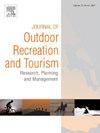Impacts of participation in scientific activities on marine tourists’ engagement and individual learning outcomes
IF 4.4
3区 管理学
Q1 HOSPITALITY, LEISURE, SPORT & TOURISM
Journal of Outdoor Recreation and Tourism-Research Planning and Management
Pub Date : 2025-01-06
DOI:10.1016/j.jort.2024.100849
引用次数: 0
Abstract
The participation of marine tourists in scientific activities or citizen science (CS) has been studied from various angles, to evaluate its benefits to science, management, policy, conservation, and tourism development. One of the main questions arising is whether this activity has positive impacts on participating tourists in the short and long term. This study measured the effects of participation in scientific activities on marine tourists, with an emphasis on relevant expected outcomes including experiential and reflective engagement, and individual learning outcomes. Using a case study of kelp forest monitoring by marine tourists in Cape Town, South Africa, a questionnaire survey was conducted between 2021 and 2022 to assess the short-term impact of participation in scientific activities by marine tourists, namely snorkelers and divers (n = 111). Their perspective was compared with that of tourists engaging in similar activities without a scientific component (n = 100). The results indicated that marine tourists participating in scientific activities were more reflectively engaged compared with regular tourists. Individual learning outcomes including interest; content, process and nature of science knowledge; and behaviour and stewardship were also more heightened for this group. This study confirms that participation in scientific activities has positive effects on marine tourists, but also suggests that tourists not yet participating in these activities can be fertile ground for recruitment in tourist programmes revolving around science and research with multiple potential benefits.
Mamagement implications
This study shows how CS based on simple tasks can effectively engage marine tourists and pique their interest in CS. This introduction can result in a further commitment to more complex CS projects which can be offered to tourists. Organisations and businesses engaging marine tourists through CS should consider the relevance of direct contact with nature and enjoyable, immersive experiences that can make CS impactful. The design of CS programmes for marine tourists should incentivise/reward participation and create a sense of inclusion in the scientific process through an open dialogue and feedback, to legitimise CS and make the experience more authentic.
参与科学活动对海洋游客参与和个人学习成果的影响
海洋游客参与科学活动或公民科学(CS)从多个角度进行了研究,以评估其在科学,管理,政策,保护和旅游发展方面的效益。其中一个主要问题是,这项活动是否会对参与的游客产生短期和长期的积极影响。本研究测量了参与科学活动对海洋游客的影响,重点是相关的预期结果,包括体验和反思参与,以及个人学习成果。以南非开普敦海洋游客监测海带森林为例,在2021年至2022年期间进行问卷调查,评估海洋游客(即浮潜者和潜水员)参与科学活动的短期影响(n = 111)。将他们的观点与从事类似活动但没有科学成分的游客的观点进行比较(n = 100)。结果表明,参与科学活动的海洋游客比普通游客更具反思性投入。个人学习成果,包括兴趣;科学知识的内容、过程和性质;这组人的行为和管理能力也更强。这项研究证实,参与科学活动对海洋游客有积极影响,但也表明,尚未参与这些活动的游客可以成为围绕科学和研究的旅游计划的肥沃土壤,具有多种潜在效益。本研究展示了基于简单任务的CS如何有效地吸引海洋游客并激发他们对CS的兴趣。这种引入可以导致进一步致力于更复杂的CS项目,这些项目可以提供给游客。组织和企业应考虑通过CS吸引海洋游客直接接触自然和愉快的沉浸式体验的相关性,从而使CS具有影响力。为海洋游客设计的科学服务计划应鼓励/奖励参与,并透过公开的对话和反馈,创造一种融入科学过程的感觉,使科学服务合法化,使体验更真实。
本文章由计算机程序翻译,如有差异,请以英文原文为准。
求助全文
约1分钟内获得全文
求助全文
来源期刊

Journal of Outdoor Recreation and Tourism-Research Planning and Management
HOSPITALITY, LEISURE, SPORT & TOURISM-
CiteScore
6.70
自引率
5.30%
发文量
84
期刊介绍:
Journal of Outdoor Recreation and Tourism offers a dedicated outlet for research relevant to social sciences and natural resources. The journal publishes peer reviewed original research on all aspects of outdoor recreation planning and management, covering the entire spectrum of settings from wilderness to urban outdoor recreation opportunities. It also focuses on new products and findings in nature based tourism and park management. JORT is an interdisciplinary and transdisciplinary journal, articles may focus on any aspect of theory, method, or concept of outdoor recreation research, planning or management, and interdisciplinary work is especially welcome, and may be of a theoretical and/or a case study nature. Depending on the topic of investigation, articles may be positioned within one academic discipline, or draw from several disciplines in an integrative manner, with overarching relevance to social sciences and natural resources. JORT is international in scope and attracts scholars from all reaches of the world to facilitate the exchange of ideas. As such, the journal enhances understanding of scientific knowledge, empirical results, and practitioners'' needs. Therefore in JORT each article is accompanied by an executive summary, written by the editors or authors, highlighting the planning and management relevant aspects of the article.
 求助内容:
求助内容: 应助结果提醒方式:
应助结果提醒方式:


